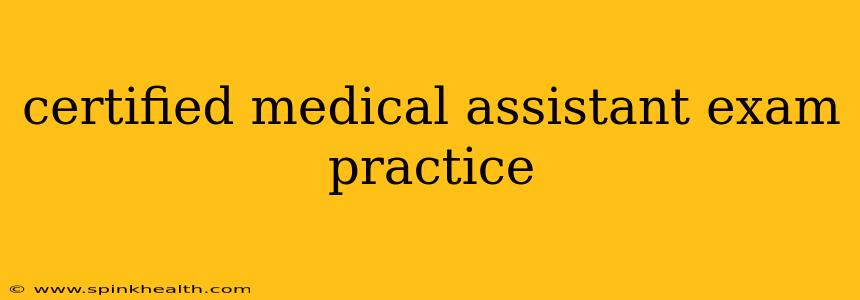The day is finally here – you're ready to take the Certified Medical Assistant (CMA) exam. The weight of expectations, the hours of study, the nervous energy… it’s all culminating in this moment. But fear not, future CMA! This isn't just about passing a test; it's about embarking on a fulfilling career in healthcare. Let's turn those nerves into focused energy with a journey through effective practice and preparation. This isn't just another cram session; it's your personal roadmap to success.
What's Covered in the CMA Exam? Understanding the Terrain
Before we dive into practice strategies, let's get a clear picture of what awaits you. The CMA exam covers a broad spectrum of medical assisting knowledge and skills. Think of it as a comprehensive assessment of your readiness to become a vital part of a healthcare team. Key areas include:
- Administrative Skills: This section tests your proficiency in scheduling appointments, managing medical records (both electronic and paper), handling insurance claims, and maintaining patient confidentiality – the backbone of smooth clinic operations.
- Clinical Skills: This is where you demonstrate your hands-on expertise. Expect questions on vital signs measurement, assisting with examinations, preparing patients for procedures, performing basic laboratory tests, and administering medications – all crucial for direct patient care.
- Medical Terminology & Anatomy & Physiology: A solid grasp of medical terminology, anatomy, and physiology is non-negotiable. You need to understand the language of medicine to effectively communicate with physicians and other healthcare professionals.
How to Prepare Effectively: A Step-by-Step Guide
Now that we know the territory, let's strategize our conquest. Effective preparation involves more than just memorizing facts; it's about building a strong foundation of knowledge and honing your practical skills.
1. Review Your Course Materials: Laying the Foundation
Begin by thoroughly reviewing your course materials. This isn't a passive reread; actively engage with the content. Take notes, create flashcards, and identify areas where you need further clarification.
2. Practice Exams: Sharpening Your Skills
Practice exams are your secret weapon. They help you identify your strengths and weaknesses, allowing you to focus your efforts where they're needed most. Many resources offer practice exams that simulate the actual test environment, giving you a realistic feel for the timing and question types.
3. Focus on Weak Areas: Targeted Learning
Once you've identified your weak areas through practice exams, dedicate extra time to mastering those specific concepts. Don't just skim over them; delve deeper into the material until you feel confident.
4. Hands-on Practice: Mastering Clinical Skills
Clinical skills require hands-on practice. If possible, seek opportunities to practice vital signs measurement, phlebotomy (blood drawing), and other clinical procedures under supervision. This practical experience is invaluable.
Frequently Asked Questions (FAQs) – Addressing Your Concerns
Here are some common questions aspiring CMAs have, addressed to ease your preparation journey:
What resources are available for CMA exam preparation?
Numerous resources are available, including textbooks, online courses, practice exams, and review materials from organizations like the American Association of Medical Assistants (AAMA). Explore different options to find what best suits your learning style.
How long should I study for the CMA exam?
The amount of time needed for preparation varies depending on your prior knowledge and learning style. However, dedicating several weeks to focused study is generally recommended.
What is the passing score for the CMA exam?
The passing score is determined by the AAMA and can vary slightly. It’s essential to refer to the AAMA's official website for the most up-to-date information.
What if I fail the CMA exam?
Don't be discouraged if you don't pass on your first attempt. Many individuals take the exam more than once. Analyze your mistakes, strengthen your weak areas, and try again.
How can I manage test anxiety?
Test anxiety is common. Practice relaxation techniques like deep breathing exercises, meditation, or mindfulness. Ensure you're well-rested and nourished before the exam.
Your Journey to Success Begins Now
Remember, becoming a CMA is a journey, not a race. Consistent effort, focused preparation, and a positive mindset are your keys to success. With dedication and the right strategies, you'll be well-prepared to confidently face the CMA exam and launch your fulfilling career in healthcare. Good luck, future CMA! Your patients await.

